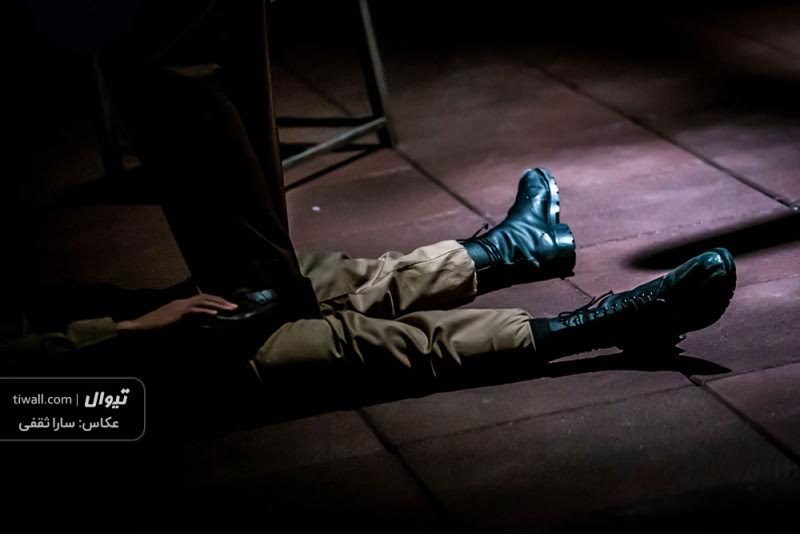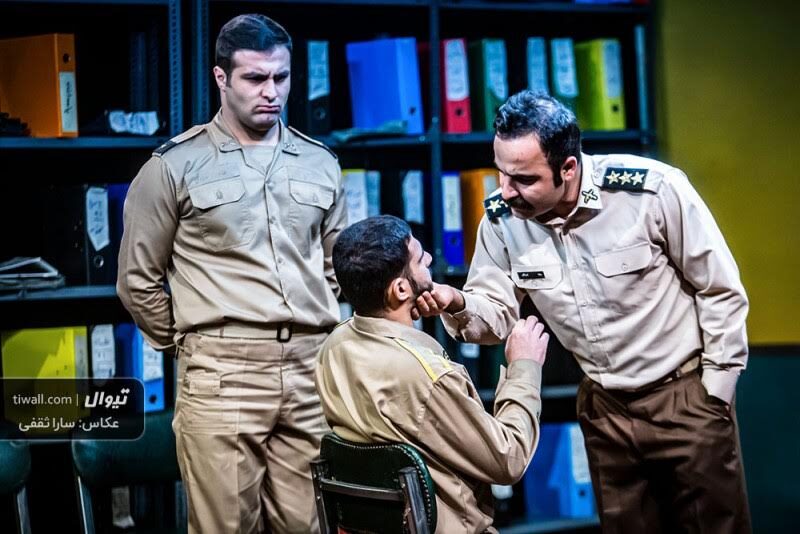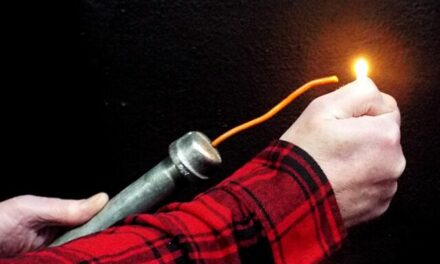Launcher 5’s honest rendition of narrative and characters is its winning card, which drew an increasingly large number of audiences to the theater during the eight months it was staged in Tehran, Iran. They were curious to peep into a dark side of life – particularly soldiers’ lives – that is normally neglected or censored not only in the official media but also in unofficial public discourse. The play’s program acknowledges this negligence by dedicating the performance to the soldiers in garrisons and to “all the seconds which feel like years, the glaring sun of boredom shining on contemplating shaved heads, the sheer loneliness of lookout posts, towers and launchers, the confined spirits in garrisons, and khaki-clad apparitions hanging about towns – those we never see.”
The play, written and directed by Pooya Saeedi and Massoud Sarrami, is a hard-hitting report of the aftermath of three mysterious murders that had taken place at a military garrison’s launcher number 5. It starts with an ordinary day in the inspection office where the inspector (Amir Nowrouzi) is interacting with his colleagues and reprimanding soldiers for disregarding minor rules. The inspector is a tough, bullying officer expecting full obedience and perfect observation of military rules by the soldiers. However, some shades of sympathy and affection can be spotted.
All of a sudden, this strict, military atmosphere, colored by the soldiers’ jokes and comic behavior, is interrupted by the report of a murder. The inspector starts a long and complicated process of interrogation, cross-questioning several soldiers to discover the culprit. This converts the play to a murder mystery, still spiced with comic dialogue and acting, which makes the audience simultaneously laugh and wonder. Meanwhile, the more the interrogation proceeds and more evidence discovered, the more violence is exerted by the inspector. After a long and arduous interrogation process, a surprising twist is introduced through soldiers’ confessions: the murder motive is related to the gang rape of a soldier. The victim, overwhelmed by pain and degradation, then committed suicide. Another soldier took his revenge by killing the leader of the gang who, in turn, murdered him.
From this point, the inspector uses increasingly ferocious methods of interrogation and torture to force the soldiers to confess. The scenes are performed so realistically that the audience experiences appalling shock and distress. Finally, just before the soldier accused of murder and rape is handed over to the court, he confesses to being a rape victim himself. The soldier, despite all the beatings and threatening, has hidden the truth from the inspector due to the caustic pain of degradation and humility.

Photo by Sara Saghafi.
Launcher 5 pioneers the use of foregrounding a sexual crime committed in garrisons, which nobody dares refer to publicly. Military service is celebrated as a holy symbol that manifests young men’s duty to their country. It is also seen as an initiation ritual where young men become adults. By going on this journey, they grow up and become strong and serious after experiencing a life full of strict discipline and tough rules.
But Launcher 5, through presenting an ugly picture of the military service, desacralizes it and implies an urgent need for reevaluation and reform. The play is a hard-hitting attack against the rough, uncompromising, and inhumane system of military service which regards soldiers collectively, and demands perfect obedience and discipline. In other words, military systems adhere too much too strict rules at the expense of soldiers’ natural and individual needs. The rapes and murders in the play are a powerful reaction to an unsympathetic system that controls soldiers by imposing a strict, unnatural lifestyle on them without providing necessary outlets to release their pressure and anger.
Launcher 5 presents military service as imprisonment that can cause severe psychological issues in young men. However, the small world of the garrison can be seen as a metaphor for a social system in which too much repression is destructive rather than constructive. It can kill people’s spirits, resulting in outbursts of crime and violence. The utterly horrifying and deformed version of Iran’s national anthem played at the end of the performance is asserts this claim. The way the anthem is sung, and the accompanying music, gives the impression of bitter mockery of the sense of duty for a ruling system that has no sympathy for its subjects. Instead, it gives them pain and humiliation.
Another focus of the play is the inspector, the difficult situation he encounters, his disturbing commitment to discovering the truth, and the moral dilemma he has to deal with. He has to choose between his commitment to finding out the truth and informing his commanders of the crimes, thus risking his job, or concealing the troubles and saving his position in the army. Also, the mental and emotional torture, pressure, and anxiety he endures while interrogating and torturing soldiers makes him another victim. He is the victim of the unbending and apathetic military system which demands his unquestionable loyalty, and apathy toward the soldiers.
A 135-minute performance, Launcher 5 all happens in the uninspiring inspection office, but it does not bore the spectators at all. The actors, all young and obscure, play their roles exquisitely. The cast includes Amir Nowrouzi, Majid Yousefi, and Milad Changhi, who are particularly outstanding. It is also worth noting that all the characters are characterized distinctively. Another significant strength of the play is that it is an impeccably-controlled mixture of funny and bitter, which prevents it from turning into a tear-jerking melodrama. This also creates a lively rhythm that helps keep the audience alert. Yet, all the jokes and gimmicks cannot prevent the audience from the heavy blow which the directors have in mind.

Photo by Sara Saghafi.
Originally a university project, Launcher 5 was successful at different theater festivals. It won various prizes, most notably, the best play award in the 19th and 21st University Theater Competitions. It was also nominated for Best Play, Best Direction, Best Male Actor, and Best Lighting Design at the Fadjr International Theater Festival in 2019. It was staged from June 2019 to February 2020 in different venues in Tehran, until the worldwide Coronavirus outbreak closed the theatres in Tehran. Not being dependent on established methods of advertising, the play reached thousands of spectators through word of mouth and won the hearts of those who had never set foot in a theatre before.
Launcher 5 gives a straightforward picture of reality and does not have any reservations against speaking the truth. This genuine honesty, along with brilliant acting, an outstanding script containing an intelligent mixture of tears, laughs, mystery, and violence, causes the spectators to trust the play and enjoy it.
This post was written by the author in their personal capacity.The opinions expressed in this article are the author’s own and do not reflect the view of The Theatre Times, their staff or collaborators.
This post was written by Baharak Sahami.
The views expressed here belong to the author and do not necessarily reflect our views and opinions.


















